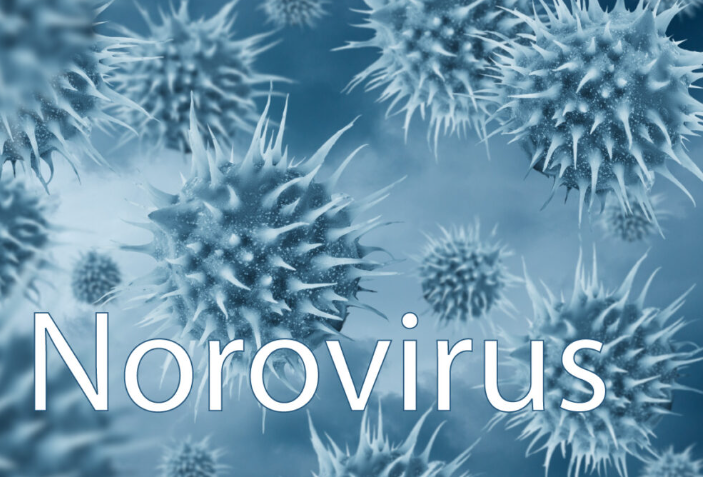Your guide to causes, symptoms, treatments and more of norovirus
A few years ago, Dr. Michelle A. Barron and her husband Greg were on a flight from Boston, where he’d competed in the Boston Marathon, to their home in Denver when she started to feel queasy. Shortly after the plane touched down, Barron, medical director for infection control and prevention at UC Health University of Colorado Hospital in Aurora, Colorado, was hit with a trifecta of unpleasant symptoms: nausea, vomiting and, eventually, diarrhea. The final symptom convinced Barron that she was suffering not from food poisoning but from norovirus.
“Usually with food poisoning, it’s one or the other, vomiting or diarrhea,” she says. “You don’t typically have both with standard food poisoning.” Based on her symptoms, Barron knew she was almost certainly suffering from norovirus, a highly contagious virus that causes the trio of unpleasant symptoms that hit her. Barron advised Greg that he’d probably be getting sick, too, and should plan on taking a couple days off work. The next evening, Greg started feeling ill and, as Barron predicted, had to call in sick at work.
Also read-Cataract Surgery : A Patient’s Guide To Cataract Surgery And Its Symptoms

What is norovirus?
An extremely contagious virus is responsible for the three symptoms that Barron experienced. It is also linked to other symptoms, such as exhaustion. According to Barron, it is frequently the cause of the stomach flu. People who are infected with it can quickly infect others around them. “People with it can shed over billions of virus particles when they are sick,” adds Barron. “It only takes a few virus particles to make someone else sick.”

The Centers for Disease Control and Prevention estimate that millions of people contract norovirus each year. In the United States, norovirus is the leading cause of acute gastroenteritis-related diarrhea and vomiting. Additionally, it is to blame for 58% of food-borne illnesses in the United States, which result in costs of roughly $2 billion, mostly in lost productivity and medical bills.

Diagnosis
According to Dr. Ephraim Tsalik, an associate professor of medicine at Duke University School of Medicine in Durham, North Carolina, who specializes in infectious diseases, the majority of people who catch norovirus are not officially diagnosed with it, and that’s okay. That’s because norovirus, which usually clears a person’s system in 24 to 48 hours, has no known cure. According to him, a tiny percentage of norovirus patients with weakened immune systems may get dehydrated and need to be hospitalized. This category of people includes very young children, the elderly, and those suffering from a major chronic illness such as cancer.

Risk factors
There are several risk factors for norovirus, says Dr. Carl Fichtenbaum, a professor in the division of infectious diseases in the department of internal medicine at the University of Cincinnati College of Medicine. They include:
- Consuming tainted food.
- Consuming tainted water.
- Interaction with a norovirus-infected person.
- Having an immune system-compromising significant medical disease, such as cancer,.
- Spending time in a cramped area, such as a hotel, resort, cruise ship, or nursing home, with plenty of other people.

Symptoms
Norovirus causes an array of unpleasant symptoms, says Dr. Shruti K. Gohil, associate medical director of epidemiology and infection prevention and assistant professor in the division of infectious diseases at the University of California Irvine Health in Irvine, California. They include:
- Throwing up
- Nausea.
- A case of diarrhea.
- Stomach aches.
- Weary.
- Ache.
- High temperature.

Treatments
Dr. Megan T. Baldridge, an assistant professor in the infectious diseases division of the department of internal medicine at the Edison Family Center for Genome Sciences & Systems Biology at Washington University School of Medicine in St. Louis, states that there is currently no vaccine or treatment for norovirus. Adults experiencing symptoms like nausea, vomiting, or diarrhea may find relief with over-the-counter drugs for gastrointestinal discomfort; however, children should not use these medications. Those with norovirus symptoms should drink lots of fluids because vomiting and diarrhea can cause dehydration, advises Baldridge.

Also read-Surgery : A Patient’s Guide To Surgery And Its Symptoms
images source: Google
Disclaimer: The opinions and suggestions expressed in this article are solely those of the individual analysts. These are not the opinions of HNN. For more, please consult with your doctor




































